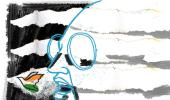Why should an elected government, any party's government, need a law to protect itself from its people? asks Shekhar Gupta.

The law of sedition is a remnant of colonial times, does India need it 75 years after Independence -- this is the question Chief Justice of India N V Ramana asked the Modi government's attorney general last month.
The question was both substantive and rhetorical. Here's why it isn't the nub of the issue.
The sedition law isn't awful because we inherited it from the British Raj.
Most of our laws have continued from the same era. This includes the Indian Penal Code, going back to 1860.
The problem with the law of sedition is that the motive behind it was colonial.
The people of a nation would mostly detest an occupational regime. Even if you force them to sing your national anthem or salute your monarch. They might still curse you silently in their hearts while pretending to sing.
You need, therefore, a law that ensures your subjects' loyalty.
Words used in the law, spreading disaffection against the State, shouldn't be found in the statute of any democracy.
Of course, if you do not like your government, as large numbers of Indians won't at any point of time, you can criticise it, campaign against it, try to defeat and bring it down.
That's normal in even a half-decent democracy, and we should believe we are better than that.
Why should an elected government, any party's government, need a law to protect itself from its people? It is a sad truth that the only laws which find bipartisan support in our broken system are the worst ones.
That's why no government, under 14 prime ministerships in 74 years, has dumped sedition.
Here is the logic why at any publication under my editorship, the word 'regime' is taboo to describe the government even by its angriest, bitterest critics, and edited out if they write it.
Because Constitutional democracies elect governments, never regimes.
You are free to love or hate your government. That's why this wretched law, where a government can criminalise criticism to protect itself, is a modern-day obscenity, not a colonial one.
Our democracy is mature enough to make the distinction between the national interest and sarkari interest.
The reason democracies are stronger and more resilient than dictatorships is just this: That its citizens are able to call out their government's flaws, prevent blunders. They are as patriotic as the rest, just smarter and braver.
That's public opinion. Can you use a law, going as far as life imprisonment, along with a stigma that could last for life, to silence these critics?
The Uttar Pradesh government filed sedition cases against journalists for merely tweeting that a farm protestor had died in police firing while the autopsy later indicated he had likely died in an accident. This, after these journalists had even corrected their earlier tweets.
The state's police have not acted on these FIRs yet. But these remain on record, and can be activated any day one of these journalists happens to irritate the powers-that-be.
The usual IPC section, like 505 (inciting trouble), wouldn't cause the same shock-and-awe.
In Haryana, a hundred agitating farmers have been charged with sedition for attacking and vandalising government vehicles, particularly the one carrying Assembly Deputy Speaker Ranbir Singh Gangwa in Sirsa.
Why couldn't the regular -- and tough -- IPC sections against rioting, obstructing public servants on duty be invoked instead?
Awful laws -- sedition, UAPA, NSA -- is where all political parties are silently complicit.
In July, the Congress government in Chhattisgarh charged a senior, serving, IPS officer, ADGP G P Singh, under the sedition law besides much else.
Read why and you won't know whether to laugh or cry. Because, the state police raiding party found shreds of freshly torn documents in the backyard of his house and when they arranged them, a frightening plot to destabilise the government emerged.
Straight from some old Vijay Jasoos caper.
We can go on, but three examples usually suffice, especially when they span across the political spectrum.
Though we also have the Congress in Maharashtra from the past when it similarly charged cartoonist Aseem Trivedi.
Or Rajasthan under Ashok Gehlot booking the VHP's Praveen Togadia in 2003.
The AIADMK used sedition against folk singer Kovan for mocking Jayalalithaa.
Just that BJP governments are now printing sedition FIRs like traffic offences.
Which brings us to the next good question the CJI asked.
Why is the use of this law so popular (I'm paraphrasing) when the conviction rate is so poor? Because the idea is never to convict, or punish judicially.
It is to ragdo (harass) through the process. Because an FIR registered, particularly for sedition, will take forever to go off the books.
That's why, with the police under their charge and no accountability, chief ministers now say, 'beta, zyada nahin bolo, nahin to sedition daal doonga (child, don't make too much noise. Or I will file a sedition case against you).'
A nation and its government, treason and sedition are not the same thing. Yet it remains fuzzy. Made worse now by social media partisanship and polarising TV channels.
Some of them merrily, and deliberately, treat treason and sedition as synonymous.
The fascinating thing is that Hindi is a very evolved language, and democratically so.
It therefore has specific words for both treason and sedition.
You'd know the distinction at first look, between desh/rashtradroh (treason) and rajya/rajdroh (sedition). It's being lost in the noise of our hyper-partisan debate.
The British abolished this law in 2009, although it had been used rarely, if at all, in the decades before that.
But we cling to it. Not just India, but the neighbours too.
Like the railways, parliamentary systems, an independent judiciary, sedition is another thing that we seem grateful to the British for. Because for under-performing governments anywhere the first escape trick is a threat to the nation.
The lyricist of Zoya Akhtar's rap movie Gully Boy had got it just right with that rant to shut everyone up, tear them apart if they talk too much because, do hazaar atrah hai, desh ko khatra hai (it is 2018, and my country is in peril).
It is easy therefore to understand why the governments so love it. It helps them conflate themselves with the nation. Remember how angry we still get over that D K Borooah slogan during the Emergency: 'Indira is India, India is Indira.'
What keeps playing out all the time with this love of the sedition law is a derivative of that.
But we must note some progress. Even on the first day of the hearing the attorney general didn't blandly defend the law. Of course, he said the law should not be struck down, but suggested that some guidelines should be laid down so it isn't misused.
The fact, however, is that the Supreme Court has read this section down twice, in the 1962 Kedar Nath Singh case and the 1995 Balwant Singh case.
And yet Uttar Pradesh can charge journalists under it for tweets. The law is an abomination in 2021. It must go.
Which takes me back to a conversation from more than 30 years ago in a village about 50 km outside Peshawar on the way to the Khyber Pass. This was when Indian journalists could still get a rare permit to visit Pakistan's tribal areas.
A Pakhtun shopkeeper who described himself as a 'Congressi', being a follower of Khan Abdul Ghaffar (Badshah) Khan, was lecturing me and Photographer Prashant Panjiar.
"Yeh kya baat huyi, munh kholo toh bolte hain, Pakistan toot jayega, Islam toot jaayega? Kya sheeshe ka bana hai mera Pakistan, mera Islam? (Nonsense, they say if we speak up, Pakistan or Islam will be destroyed. Is my Pakistan or Islam made of porcelain?)."
That's the kind of question the CJI should be asking the attorney general about India at the next hearing.
By Special Arrangement with The Print












 © 2025
© 2025